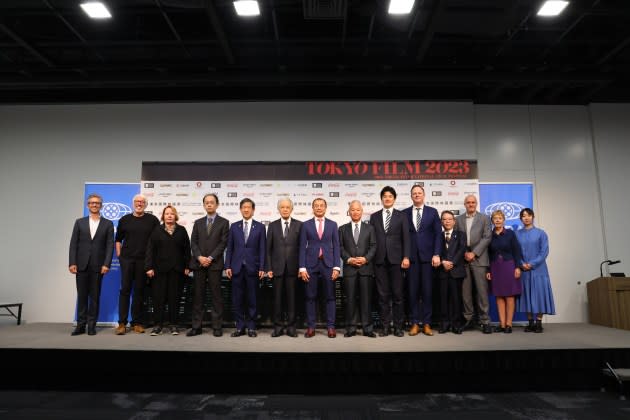Losing ‘The White Lotus’ Season 3 Over Tax Incentive & Dodging Police To Shoot In Shibuya: Japanese Producers Discuss Industry Struggles — Tokyo Film Festival

As the Tokyo Film Festival returns with a focus on international expansion, this year’s MPA seminar hosted as part of the festival industry program was centered around how to make the country a more attractive production environment for international producers.
“The world is in love with Japan,” Toho Tombo producer Georgina Pope told the seminar in her opening keynote speech. “There is a massive global interest in everything Japanese: art, fashion, youth culture, food. And IP such as Anime, Manga, and film.”
More from Deadline
'Godzilla Minus One' Lands UK-Irish Deal Ahead Of Tokyo Film Festival Debut
Tokyo Opening Night: Ryuichi Sakamoto Tribute, Wim Wenders & Zhang Yimou Lifetime Honor
To harness this interest, however, Japan must address a series of key lapses in official film infrastructure, Pope told the audience. One of the main issues, Pope said, is the country’s lack of an official shooting permit system.
“Most directors want to shoot in Shibuya and Shinjuku. Yet, the days I put on my work boots to shoot in those areas, I’m made to feel like a criminal,” Pope said. “There isn’t a proper location permit system in place. It’s all run and gun. And fingers crossed you don’t get shut down or asked to move on. It’s also very risky, especially for a large crew.”
Pope said that shooting without permits is “an extremely stressful way to work,” particularly when the production involves the use of large international crews, later adding in a Q&A session alongside Debra Richards, director of APAC content and studio affairs at Netflix, producer Niv Fichman and Ruriko Sekine of the Japan Film Commission, that she had developed “very pleasant ways” to explain the unique set up to international producers.
“I use the word guerilla a lot to make it sound exciting and just explain that it is difficult in some areas,” Pope said. “And there are some parts of town that really don’t like film crews, and I tell them we’re taking a bit of a risk here. A centralized system would really help the industry in the long term.”
The veteran producer later added that she has frequently been picked up by authorities for shooting on the street in Tokyo because it’s still not possible to obtain an official work permit.
“On one particular project many years ago, I was escorted away from the area by the gentlemen in blue because a crowd had gathered very quickly because of a well-known actor,” she said. “I was taken down the police station and given a good talking to, and that’s happened several times.”
Moving on, Pope zeroed in on the state of the country’s film and TV production tax incentive, which was launched in September. The incentive program was organized by Japan’s Visual Industry Promotion Organization (VIPO) and the Japan Film Commission and is the country’s first official incentives program for offshore film and TV productions. The scheme, which is under the jurisdiction of Japan’s Ministry of Economy, Trade and Industry (METI), funds up to one-half of the qualifying Japanese spend on international productions, with a JPY1BN ($6.8M) cap. Eligible productions include “large-scale overseas TV and film projects shot on location in Japan.”
“We are so far behind our neighbors, and be under no illusions, our neighbors, especially in Southeast Asia, are big, looming competitors for the Japan-based industry,” Pope said. “A lottery system does not work. A shared purse does not work. Producers need a predictable, robust, easy-to-understand system like they have in the United Kingdom, Australia, New Zealand, or like our fiercest competitor, Thailand.”
Pope went on to detail a location scouting trip she went on recently with a “high profile showrunner,” along with his producers and studio executives. Pope said the showrunner was eager to shoot in Japan, and the locations worked well with the show’s creative vision.
“It was a great scout. We saw some absolutely stunning locations all over Honshu. The showrunner loved it all, and I was feeling very confident that I had it all in the bag,” she said.
However, one day during the trip, the showrunner and his producers were pulled away by their buzzing phones.
“It was a Thai production company informing them that the Thai government had just announced a renewal and improvement on their film incentive system. A 30% rebate. For their project, that meant 4.4 million dollars alone,” she said. “Everyone looked at me with sympathy. At the time in Japan, we had no incentive in place at all. I could not respond with a concrete answer. All I could hear was the sound of a 35 million dollar project flying out the window.”
Following Pope’s keynote, Deadline confirmed that the mentioned showrunner was Mike White, and the scouting trip was for the third season of his Emmy award-winning HBO series The White Lotus. Later in the session, Ruriko Sekine of the Japan Film Commission highlighted that Mission Impossible Fallout, the sixth installment in Tom Cruise’s spy series, and Martin Scorsese’s religious epic Silence also both left Japan to shoot in neighboring countries despite a strong desire to be based in the country due to the issues outlined above.
“Sadly, it’s not an isolated incident,” Pope said.
Elsewhere during the seminar, the speakers discussed the country’s need to restructure and prioritize film education to develop new talent and professionalize production practices across the industry.
The Tokyo Film Festival’s industry program runs until October 27. The festival runs until November 1. The closing film is Toho’s Godzilla Minus One.
Best of Deadline
SAG-AFTRA Interim Agreements: Full List Of Movies And TV Series
2023 Premiere Dates For New & Returning Series On Broadcast, Cable & Streaming
Sign up for Deadline's Newsletter. For the latest news, follow us on Facebook, Twitter, and Instagram.

 Yahoo News
Yahoo News 